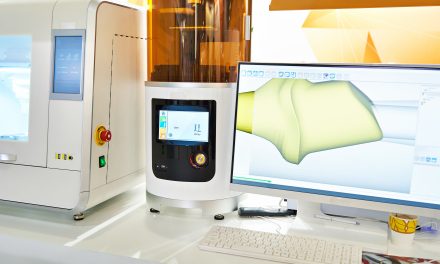Osteoporosis is a disease of the skeleton, in which bone density decreases and bones lose strength. This also applies to the jawbone. The term ‘osteoporosis’ is derived from the Greek words ‘osteo’ that means ‘bone’, and ‘poros’ (meaning ‘pore’ or ‘hole’) and translates as ‘porous bone’.
Osteoporosis is a common disease, with older people in particular being affected. The course of the disease often shows a very gradual progression. Especially in the early stages, it is difficult to look at bone loss and diagnose the symptoms clearly. Common consequences of osteoporosis include broken bones, porous vertebral bodies, weight loss and restricted mobility. Another sign is that a person’s dentures no longer fit well and securely.
Loosely fitting dentures due to bone loss
When the bone of the jaw becomes less dense and shrinks, it can affect the fit of the dentures. With bone loss in the jaw, the dentures lose their stable base. The result can be a loose prosthesis which no longer fits snugly in the mouth. In these cases, people often retry using adhesive cream and assume that their dental prosthesis is defective.
However, the cause usually lies elsewhere – osteoporosis. The jawbone to which the prosthesis has been individually ‘tailored’ has in fact receded or shrunk with the result that the dentures lose their firm hold. An investigation at the dentist will help to identify whether the poor fit of the denture is due to osteoporosis.
If the loose fit of the dentures is due to bone loss, there are various possible solutions to restore the good fit of the prosthesis. The simplest solution is to just reline the existing prosthesis thus restoring its proper fit. Employing dental implants is another strategy to provide a firm hold for the prosthesis again.
Can dental implants be used effectively if the bone of the jaw is affected by osteoporosis?
Yes, implants can be inserted even if the jawbone is brittle due to osteoporosis. Dental implants are in fact a proven method to replace missing teeth. The implants are introduced into the jawbone and serve as a fixed anchor for the new dentures.
In the case of decreased bone density, there may be possible restrictions on the use of implants, or there might be a longer healing time, but it is osteoporosis on its own is not a sufficient contraindication against dental implants. The dentist will create a risk profile, based on the patient’s general health and their oral situation, on the basis of which the dental treatment is planned and carried out.
Any medication that the patient is taking should also be taken into consideration. Bisphosphonates, which are often used to treat osteoporosis, may impact the healing of the implants. In such cases, the dentist will consult with the patient’s attending physician.
Once the implants that have been inserted into the jaw have healed, they will form a stable and resilient basis for the patient’s dental prosthesis, ensuring a snug and comfortable fit.
The new or refurbished dentures significantly improve the patient’s quality of life. So it’s very important for patients with osteoporosis to know that dental implants are also an option for them and contact their dentist to explore the possibilities of an implant denture.
If you have osteoporosis, inform your dentist!
So our tip is to inform your dentist if you suffer from osteoporosis and what medication you are taking. The so-called bisphosphonates often prescribed for osteoporosis affect bone metabolism. This can increase the risk for complications during the dental treatment, for example with the wound healing after a tooth extraction.





